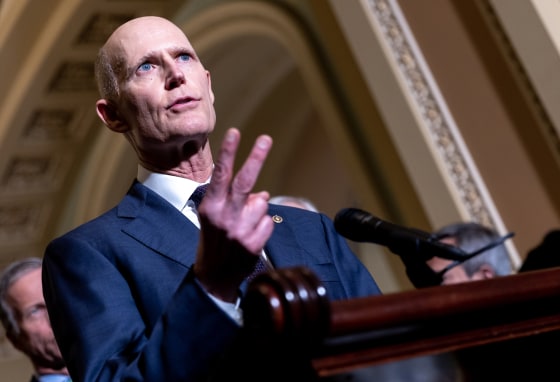When Sen. Rick Scott released his “Plan to Rescue America,” he wanted it to be a blueprint for the GOP to take back the upper chamber of Congress in November.
But that proposal from the head of the National Republican Senatorial Committee appears to be helping Democrats, or at least that's what recent messaging testing found, according to documents obtained by NBC News.
One key aspect of Scott's plan bashed by fellow Republicans calls for requiring poor people to start paying income tax. Democrats have featured that in ads and plan to do so again on Tax Day, April 18. Scott has been at pains to explain it away, even in an interview on Fox News, by arguing it's about making everyone have a vested interest in the federal government.
In a peek of its upcoming messaging strategy, the Democratic Senatorial Campaign Committee recently field-tested Scott's plan with swing state voters and found strong aversion to the tax increase language as well as the idea of sunsetting all federally funded programs in five years, which would mean ending Social Security, Medicare, Medicaid and the Affordable Care Act.
Before he released the plan on Feb. 23, Scott told NBC News he knew the proposal was controversial, but noted that Congress could re-authorize any federal programs it deems essential.
“I believe it’s all doable,” Scott said. “Is it hard? Yeah, it’s hard. Or it already would have been done.”
For Democrats, who face a tough battle defending their slim Senate majority in November, the proposal is seen as an unexpected political lifeline.
When voters were asked about ending Medicare, Medicaid and Social Security, Scott's plan proved to be the most potent of messages, according to the survey conducted by Blue Rose Research, a Democratic messaging and research firm. The field test showed that 65 percent of respondents said they would be less likely to support the GOP, 16 percent said it made no difference and 19 percent — all conservatives — said it would make them more likely to back Republicans.
“This message drives the largest drop in Republican vote share among voters over 65+, Latino voters, and white voters without a college degree,” according to Blue Rose Research, which interviewed 2,777 voters in Arizona, Georgia, Nevada, New Hampshire, Pennsylvania and Wisconsin via online web panels March 25-30.
The figures also showed voters were more likely to support a candidate who was “standing up against Senate Republicans’ new plan that would raise taxes on working families. Republicans’ plan would raise taxes on over half of all Americans — especially on seniors, families with children.”
As for candidates who supported that tax portion of Scott's plan, the survey showed 60 percent of voters said it made them less likely to back those Republicans; 22 percent said it made no difference; and 18 percent — all conservatives — said it would make their support more likely. The voters most turned off by the GOP proposal were voters 65 and over, women and white voters without a college degree.
The survey also isolated the opinion of self-described Trump voters and found that, by 46-34 percent, they would be less likely to support candidates who favored cutting Medicare, Medicaid and Social Security. As for imposing an income tax on poorer Americans, 41 percent of Trump voters said they’d be less likely to back Republicans in 2022, while 30 percent — nearly all conservatives — said it would make them more likely to support the GOP.
When asked about ending the Affordable Care Act — and therefore allowing insurance companies to charge more money for health care and end “protections for pre-existing conditions" — most voters were also opposed, with 55 percent against the idea, 19 percent saying it made no difference and 27 percent — almost all conservatives — saying it would make their support more likely.
Unlike the other two items studied, ending the Affordable Care Act, also known as Obamacare, was a particularly salient issue for younger voters. Respondents 35 or younger were more turned off by the proposal when compared to older voters.
